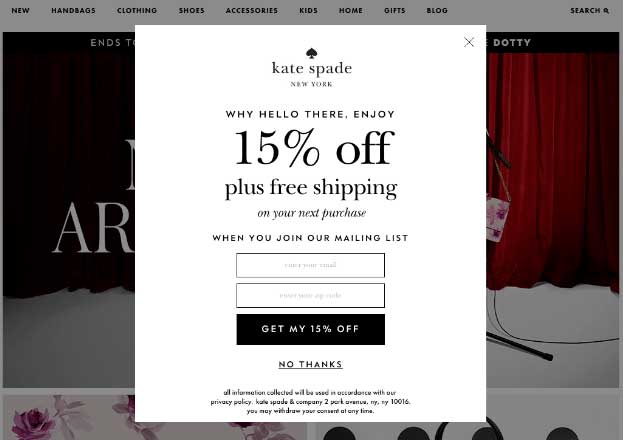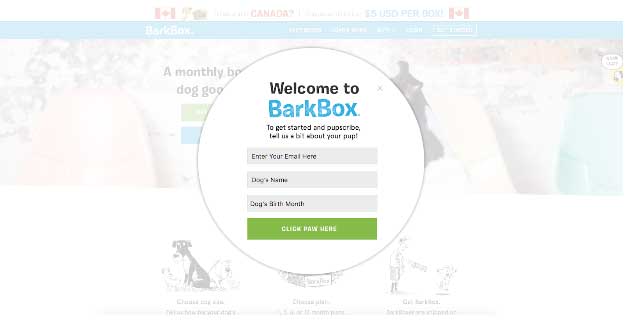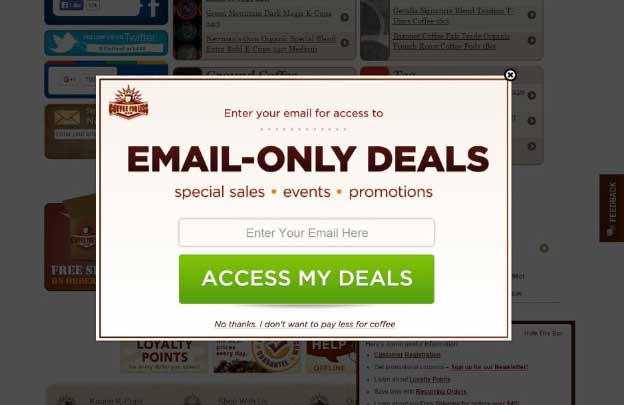Why are Email Pop-ups Effective?

A large part of what makes email pop-ups effective is their use of a technique called “pattern interrupt”. Anything that changes a person’s behaviour or thought in an instant can be considered as a pattern interrupt.
It is an important ingredient in funny jokes, viral YouTube videos, and cold calls that sell. It’s something you say or do that makes another person abruptly pause, think, and reconsider.
Simply put, email entry pop-ups are effective because they are great at instantly affecting someone’s thoughts and behaviour.
However, the same reasons why they are effective can also make people perceive them as annoying and intrusive. Email pop-ups can be tricky to implement, but when done right, they can do wonders for your marketing campaign.
Elements of Email Pop-ups that Work
If you want your email pop-up to rake in subscribers, it has to have the following elements:
- Attention-grabbing design
- Creative, fun language
- Irresistible offer
- Right triggers
- Sense of Urgency
- Compelling call-to-action
- No spam pledge
- Clickshaming
Let’s talk about each of them in a bit more detail.
1. Attention-Grabbing Design
Your pop-up should stand out and not blend into the background, otherwise a site visitor will automatically ignore it and you fail to harvest the email address. Worse, they may think that something is wrong with your site, forcing them to bounce off your page.
Grey out the rest of the page to make the pop-up the centre of attention, and use strong imagery and interesting colours. Or you can go for a minimalist look, and wow them with effective use of white space and typography.

2. Creative and Fun Language
Visitors to a dog website will better appreciate an email pop-up that says “Join the pack” and “Get started and pupscribe” rather than something generic like “Subscribe to our mailing list”. The site visitor is interested in dogs, and is conceivably already familiar with canine jargon and puns, and will appreciate words that resonate with their love for these animals.

Use of humour can be powerful. Fun language in your pop-up will give the impression that emails you send subscribers will also be fun and enjoyable to read.
3. Irresistible Offer
If you have an e-commerce website, you should know that the most compelling offer you can make is a great discount, a free item, or free shipping. Who doesn’t want to save money or receive freebies?

Another incentive that works well is to offer the chance to win prizes in sweepstakes or contests. You can also entice subscribers by promising them advanced previews of new products or exclusive offers and discounts. These promises are not as appealing though, since they do not provide instant gratification.
4. Right triggers
Should your email pop-up appear immediately, or after your visitor has spent some time on your page? The trigger for the pop-up should be timed right, for maximum email harvesting potential.
If the pop-up is the first thing that your reader has to deal with, avoid making it overwhelming. Make sure the close button is easy to find. If not, your visitor will find it easier to just close the browser tab entirely.
Popular nowadays are exit intent email pop-ups. These track the movements of a user, so the pop-up only gets displayed when they show signs of leaving your page, such as moving the mouse towards the close tab button.
![]()
5. Sense of Scarcity and Urgency
Give your users a persuasive reason to act now, and chances are, they will. For example, you can make discount offer for a specific item available for only 12 hours, or your free shipping code valid only on the weekend before Mother’s day.
Or let the user know that you are giving the offer to only a selected number of people. Make users feel that they will miss out on something big if they don’t sign up and do it right now.
6. Compelling Call-to-Action
The CTA (call-to-action) button has to be value-driven. To make someone click that button to submit their email address, they need to have a clear idea of what’s waiting for them on the other side.
As a matter of fact, you should avoid using the word “Submit” or “Subscribe” in your CTA button. It makes the user feel that they’re the one giving you something, when you should make them see what benefit they will get instead.

7. No Spam Pledge
It’s good practice to remind would-be subscribers that you respect their privacy, and that you’ll never send them SPAM. They need to know that you’re not going to sell, distribute, or use their email addresses for anything other than giving what they signed up for.
8. Clickshaming
Examples of click-shaming include “No thanks, I don’t like discounts” or “No, I don’t like to change my life” and “No, I want to look unprofessional”. Clickshaming uses a negative link that incites people to think that opting out makes you terrible at life.
So you can imagine why this tactic won’t work with everybody. It comes off as rude, passive-aggressive, and even offensive. You may want to tone down the shaming, and make sure you do A/B testing to see if this gets you successful sign-ups.
Optimize Your Targeting
So you have designed an email entry pop-up and are ready to deploy it. There are a few things you need to consider so that your visitors, both new ones and existing subscribers, will be targeted correctly. After all, your opt-in form is meant to harvest new email addresses, and not annoy your returning customers.
For optimum performance, your email pop-up should apply to new visitors only, and should only ever show a few times (max. 3). You should also make it a point to exclude those who visit via email referral.
It’s also best to display the pop-up after at least 10 seconds of active visitor interaction. If the visitor is passive, then make use of an exit intent trigger.
Conclusion
The importance of your email list cannot be underestimated. Ramsay Taplin, the founder of Blog Tyrant, said that “Even if all of my search rankings disappeared tomorrow I’d still be able to promote my blog to tens of thousands of people via email.”
Therefore growing your email subscribers needs to be on your priority list. And one of the most effective methods to capture email addresses is with the use of email entry pop-ups.
But not all email pop-ups are created equal. So when creating one, consider the vital elements outlined above, and you’ll be on the right track.
